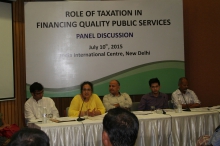The role of taxation in funding quality public services

The meeting took place against the backdrop of the Third International Conference on Financing for Development, in Addis Ababa, 13-16 July, where discussions were to take place on funding sources and mechanisms for the realisation of the Sustainable Development Goals (SDGs) that cover essential services such as health, education, water and sanitation and energy, among others.
Opening remarks were made by Susana Barria, from Public Services International (PSI) who shared that the experience of the failure of private funding for- and private participation in -provision of services, has led PSI and many other organisations to call on governments to exclude essential public services from private sector partnerships and private financing and from the agenda of the Conference on Financing for Development. PSI believes, she said, that mobilising public finance for publicly provided services is a far more realistic option. Building efficient and fair tax systems as well as fighting corruption, tax evasion, and illicit financial flows are an essential part of this agenda. India is a case in point as with rising wealth and the dominant role of Indian and foreign transnational corporations, mobilising taxation based finance is a realistic option, though not the preferred one.
The two hour discussion delved into critical aspects of the debate. Amitabh Behar, from the Global Campaign Against Poverty kicked off the discussion by reminding the audience of the issues at stake at the Conference on Financing for Development and the dangers of legitimising the role of private sector and philanthropists. Chirashree Das Gupta, professor at Jawaharlal Nehru University highlighted striking trends in India's tax policies and made a compelling case for increasing the effective direct taxation rate for corporate; reforming tax laws to suitably identify income, wealth and property holdings; scraping undue privileges; and making tax data transparent. Anjela Taneja, from the Global Campaign for Education argued that anyone working for provision of essential services has to take the tax justice agenda seriously, as failing to do so would lead to the dangerous consolidation of private sector financing in development. Jammu Anand from the National Platform against Water Privatisation, delved into the challenges facing the provision of quality public services at the municipal level, giving the instance of PPPs in the water sector in Nagpur that led to higher costs and decreased quality. Raghav Chadha, Aam Admi Party Spokesperson, explained the steps taken by the Delhi Government to consolidate tax collection in the State in order to increase its budgetary allocation to education and health in the recently released Delhi State budget 2015-16.
Deputy Chief Minister of Delhi Manish Sisodia concluded the panel by stressing that this government is ready to enter into dialogue with civil society representatives to shape the services provided by his administration.
The rich discussion was followed by robust responses from several organisations co-organising the event. To cite a few, Neeti Biyani, from the People's Budget Initiative, illustrated that illicit financial flows out of the developing world exceed aid and foreign direct investments coming to the developing world, stressing that more than 40% of these illicit flows are contributed by Asia, India being among the top 4 contributors. She also stressed that despite the rhetoric of the current government on bringing back black money from abroad, the critical issue is actually to stop the creation of new black money, 60% of which is created through tax evasion.
Mahendra Sharma, from the International Transport Workers Federation South Asia, pointed out that dismantling of bus transportation services has its roots in the change in government policy which no longer sees this service as a responsibility of the state. Rajeev Mehta, from the Delhi State Electricity Workers Union gave a firsthand account of the effects of bad working conditions on quality of services, making a strong point that quality of work and living conditions of the workers that provide services are part of the discussion on quality public services. Annie Namala, from Centre for Social Equity and Inclusion drew the audience's attention to the fact that the barriers to access are not limited to economic factors but also include social factors, that need to be addressed along with the issue of improving service quality.
The event followed a joint statement released on World Public Services Day raising similar issues and was organised by ActionAid India, Building and Wood Worker's International (BWI) South Asia, Centre for Budget and Governance Accountability (CBGA), Centre for Social Equity and Inclusion (CSEI), Indian Social Action Forum (INSAF), National Campaign Committee for Eradication of Bonded Labour, National Campaign on Dalit Human Rights (NCDHR), National Confederation of Dalit Organisations (NACDOR), National Platform against Water Privatisation (NPAWP), National Right to Education Forum, Oxfam India, Peoples Budget Initiative (PBI), Public Services International (PSI) South Asia, Right to Food Campaign, South Asia Equity Forum, UNI India Liaison Council (UNI ILC), Wada Na Todo Abhiyan (WNTA).

